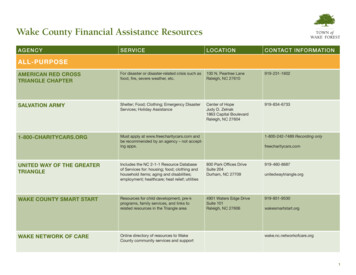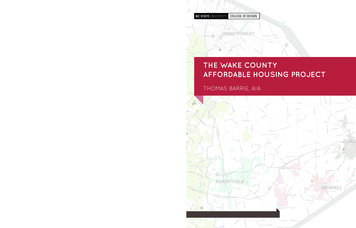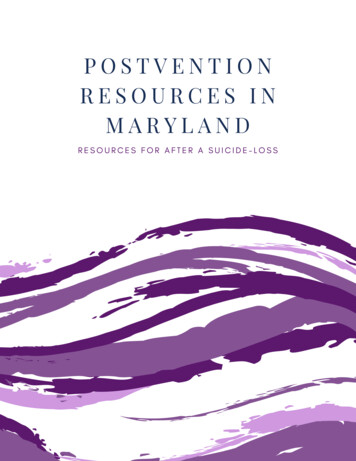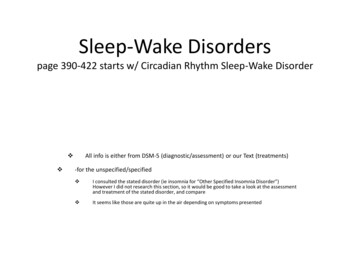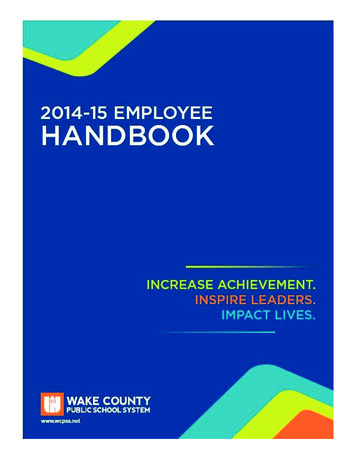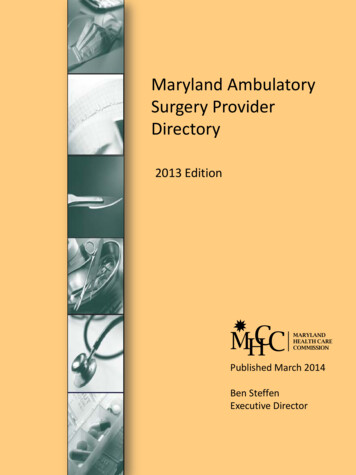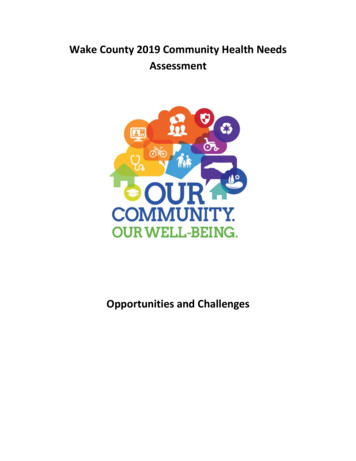
Transcription
Wake County 2019 Community Health NeedsAssessmentOpportunities and Challenges
2019 WAKE COUNTY COMMUNITY HEALTH NEEDS ASSESSMENTMESSAGE FROM THE CO-CHAIRSDear Wake County Residents,Wake County is ranked as North Carolina’s healthiest county for the fourth year in a row. The health ofour county is one of the top reasons why we are consistently known as one of the best places in the nationto live, work, learn and play.This success is possible thanks to initiatives like the Community Health Needs Assessment (CHNA), whichis a great collaboration between county residents and many community partners. It is also influenced bythe social and economic determinants of health, like behavioral, physical and environmental health, andthe differences in geography and demographics throughout Wake County.The CNHA process allows our community to assess the health needs of Wake County every three years. Itis a highly collaborative effort between Wake County Human Services, Advance Community Health, DukeRaleigh Hospital, UNC REX Healthcare, United Way of the Greater Triangle Wake County Medical SocietyCommunity Health Foundation and WakeMed Health and Hospitals.Additional input was provided by numerous organizations and community partners represented on thesteering committee. Most importantly, completion of the CHNA process would not have been possiblewithout valuable feedback provided by the residents of Wake County through in-person communitymeetings and an online survey.The first step of the assessment was to collect and analyze existing statistical data. Second, the report wasinformed by input from organizations and the community at large. Surveys, focus groups, andprioritization meetings allowed the CHNA team to identify priority areas of need and related resources.The data analysis and community input comprise this report. Overall, we hope that the information in thisreport will help guide decisions to make Wake County an even healthier community.Moving forward, the CHNA process is being combined with recommendations from the Population HealthTask Force, in an exciting new alignment - LIVE WELL WAKE. Action steps and measures of success will bedeveloped with partners and stakeholders using a results-based accountability methodology. Althoughthe report is done, our work will continue as we develop action plans and strategies in the coming monthsto address the identified priorities and make improvements in those areas that will benefit the residentsof Wake County.With best regards,Steve BurrissPresidentUNC REX HealthcareSig HutchinsonWake County Board of CommissionersCo-Chairs of the Wake County Community Health Needs AssessmentMESSAGE FROM THE CO-CHAIRSi
2019 WAKE COUNTY COMMUNITY HEALTH NEEDS ASSESSMENTACKNOWLEDGEMENTSThis Community Health Needs Assessment (CHNA) represents the culmination of work completed bymultiple individuals and groups during the past year. We would like to thank all the community memberswho provided their input via focus groups, Internet-based surveys, telephone surveys, and the communityprioritization process. In addition, we would like to thank the following groups and individuals:Wake County Human Services Project Management Team Allie George, CHNA Project Manager, Wake County Human ServicesDr. Sue Lynn Ledford, Wake County Human ServicesEdie Alfano-Sobsey, CHNA Scientific/Technical Advisor, Wake County Human ServicesLechelle Wardell, CHNA Project Manager, Wake County Human ServicesLaNarda N. Williamson, CHNA Project Assistant, Wake County Human ServicesCommunity Health Assessment Team (CHAT) Edie Alfano-Sobsey, Wake County Human ServicesAlicia Barfield, Duke Raleigh HospitalLinda Barrett, WakeMed Health and HospitalsSteve Burriss, UNC REX HealthcareSara Carter, Youth ThriveJoseph Current, United Way of the Greater TriangleAndi Curtis, WakeMed Health and HospitalsAllie George, Wake County Human ServicesErin Gill, UNC REX HealthcareAtha Gurganus, Wake County Medical Society Community Health FoundationKerry Grace Heckle, UNC REX HealthcareSig Hutchinson, Wake County Board of CommissionersEric Johnson, Alliance HealthTara Kinard, Wake County Medical Society Community Health FoundationAndrea Layton, Duke Raleigh HospitalDr. Sue Lynn Ledford, Wake County Human ServicesRegina Petteway, Wake County Human ServicesShelia Reich, Youth ThriveLechelle Wardell, Wake County Human ServicesPenny Washington, Advance Community HealthLaNarda N. Williamson, Wake County Human ServicesCourtney Wilson, Advance Community HealthEmily Ziegler, UNC REX HealthcareACKNOWLEDGEMENTSii
2019 WAKE COUNTY COMMUNITY HEALTH NEEDS ASSESSMENTCommunity Health Needs Assessment Steering Committee Steve Burriss, Steering Committee Co-Chair, UNC REX HealthcareSig Hutchinson, Steering Committee Co-Chair, Wake County Board of Commissioners Darren Abbacchi, Wake Forest Police Dept.Gideon Adams, Food Bank of Central and Eastern North CarolinaJohn Alexander, North Carolina General AssemblyPaul Anderson, The Fountain of Raleigh FellowshipPatrice Andrews, Town of MorrisvilleJack Baldwin, Town of GarnerCynthia Ball, North Carolina House of RepresentativesVerna Best, Wake County Human Services/Wake County Cooperative ExtensionDarryl Blevins, Wake County Human ServicesTara Shepherd Bowdel, Salvation ArmyChris Budnick, Healing Transitions (Formerly The Healing Place)Freda Bullock, Dorothy Mae Hall Women's Center, WendellJohn Burns, Wake County Board of CommissionersMother Rita Johnson Byrd, Saint Augustine's UniversityJohn Byrne, Mayor, Town of Fuquay-VarinaJose Cabanas, Wake EMSMatt Calabria, Wake County Board of CommissionersDr. Julie Casani, North Carolina State UniversityTJ Cawley, Mayor, Town of MorrisvilleBeverly Clark, Mayor Pro Tem, Town of ZebulonTad Clodfelter, Jr., Southlight HealthcareAdrienne Cole, Greater Raleigh Chamber of CommercePatricia Coleman, Wake County Human ServicesKimberly Collins, BAREUPJohn Collins, YMCA of the TriangleJennifer Conner, SAS InstituteLeslie Covington, The Carying PlaceJulie Cox, Inter-Faith Food ShuttleJonathan Cox, Town of Fuquay-VarinaKatie Craig, Greater Raleigh Chamber of CommerceLisa Crosslin, Passage HomeMolly Curry, Wake Technical Community CollegeNancy Daly, Wake County Environmental ServicesNelson Dollar, former member, North Carolina House of RepresentativesNicole Dozier, Mayor Tempore, Town of ApexACKNOWLEDGEMENTSiii
2019 WAKE COUNTY COMMUNITY HEALTH NEEDS ASSESSMENT Frank Eagles, Mayor, Town of RolesvilleRaven King Edwards, Office of Minority Health & Health DisparitiesDavid Ellis, County Manager, Wake County GovernmentGreg Ford, Wake County Board of CommissionersDenise Foreman, Wake County GovernmentDr. Sharon M. Foster, Wake County Human Services BoardCarolyn Freeman, Spring Arbor of CaryLinda Frenette, Fuquay-Varina Chamber of CommerceSeth Friedman, Passage HomeSatish Garimella, Morrisville Town CouncilKen George, Town of CaryRosa Gill, North Carolina House of RepresentativesKate Ward Gonzalez, The Salvation ArmyVirginia Gray, Mayor, Town of WendellShaneka Grimes, Office of Minority Health & Health DisparitiesPetra Hager, Wake County Human ServicesPat Haggard, Holly Springs Food CupboardJenisha Henneghan, Triangle J Area Agency on AgingKristie Hicks, North Carolina Cooperative ExtensionMartha Grove Hipskind, Triangle J Area Agency on AgingJessica Holmes, Wake County Board of CommissionersLisa Humphreys, YMCA of the TriangleJoe John, North Carolina House of RepresentativesDr. Larry Johnson, Gethsemane Seventh-day Adventist ChurchLiz Johnson, Town of MorrisvilleAnna Johnston, Holly Springs Economic DevelopmentNiki Jones, City of Raleigh, Housing and Neighborhoods DepartmentLinda Graham Jones, City of Raleigh Housing and Neighborhoods DepartmentRyan Jury, Advance Community HealthBrandon Kastner, Glenaire Retirement CommunityFaisal Khan, Carolina Peace CenterTroy Kidd, The Blood ConnectionRussell Killen, Knightdale Town CouncilAudra Killingsworth, Apex Town CouncilIrena Krstanovia, Town of Holly SpringsJai Kumar, North Carolina Healthcare AssociationChristine Kushner, Wake County Board of EducationRita Anita Lager, Recovery Communities of North CarolinaGeoff Lang, MetLifeACKNOWLEDGEMENTSiv
2019 WAKE COUNTY COMMUNITY HEALTH NEEDS ASSESSMENT Jeffrey M. Leonard, Town of Wake ForestJohn Letteney, Town of ApexCaroline Loop, Wake County Environmental ServicesTajuana Crosby Lordeus, Help Health Education and Lifestyle ProgramsElaine Loyack, Delta Dental of North CarolinaJohn Lucket, Raleigh Rescue MissionAlice Lutz, Triangle Family ServicesDale Mann, NCPA/NAMISandra Mann, NCPA/NAMIJeff Mann, GoTriangleHoward Manning, Dorcas MinistriesKen Marshburn, Garner Town CouncilJim Martin, Wake County Board of EducationRobert Matheny, Mayor, Town of ZebulonMark Matthews, Town of Fuquay-VarinaNancy McFarlane, Raleigh City CouncilSusan Meador, Center for Volunteer CaregivingRick Mercier, Town of GarnerJeff Merritt, PNC ArenaSara Merz, Advocates for Health in ActionCarole Meshot, Raleigh Midtown Rotary ClubJoe Milazzo, Regional Transportation AllianceMaurita Miller, In Our Shoes, Inc.Yvonne Monroe, Carolina Partners in Mental HealthChristine Montague-Hicks, Raleigh Rescue MissionKellan Moore, John Rex EndowmentAnnie Jean Moore, Zebulon Chamber of CommerceKaren Morant, Wake County Human ServicesPeter Morris, Urban MinistriesKati Mullan, Read and FeedDebra Nasser, Wake Forest Charter AcademyTerry Nolan, Wake County Planning DepartmentMichael Orbon, Wake County Environmental ServicesMartha Paige, Town of MorrisvilleShafi Parekh, RI District 7710 North Carolina-USAVirginia Parker, Bank of AmericaSteve Parrott, Wake Education PartnershipDr. John Perry, AHEC, WakeMed Health and HospitalsSharon Peterson, Wake County Planning DepartmentACKNOWLEDGEMENTSv
2019 WAKE COUNTY COMMUNITY HEALTH NEEDS ASSESSMENT Jennifer Pfaltzgraff, The Arc of the Triangle, Inc.Erv Portman, Wake County Board of CommissionersTamara Prosper, Tamara G. Prosper, LLCShawn Purvis, Town of ApexMegg Rader, Alliance Medical MinistrySteve Rao, Morrisville Town CouncilSonya Reid, Wake County Human ServicesHolly Richard, Tammy Lynn CenterAl Richmond, Community Campus Partnerships for HealthJames Roberson, Mayor, Town of KnightdaleJennifer Robinson, Cary Town CouncilNathan Robison, Sunrise Senior Living of RaleighPortia Rochelle, Word for Transformation Church and Outreach Center, Inc.Emily Roland, Advocacy & Rural Health North Carolina Healthcare AssociationAnn Rollins, Alice Aycock Poe Center for Health EducationChad Sary, Town of KnightdaleDiane Sauer, City of Raleigh Parks and RecreationAnnie Schmidt, NAMI Wake CountyRichard Sears, Mayor, Town of Holly SpringsShirley Sheares, AME Church Shelter for HomelessKate Shirah, John Rex EndowmentJonas Silver, Town of KnightdaleDr. James Smith, Wake County Human Service BoardDr. Mike Spiritos, Duke Raleigh HospitalJoe Stallings, Town of GarnerRuss Stephenson, Raleigh City CouncilLaurie Stickney, Community Partnership Inc.Pat Sturdivant, Capital Area Workforce DevelopmentJeanne Tedrow, North Carolina Center for Non-ProfitsJohn Thoma, Transitions LifeCareJoseph Threadcraft, Wake County Environmental ServicesAnna Troutman, Wake County Smart StartRuben Wall, Town of Wake ForestBridget Wall-Lennon, Wake Forest Board of CommissionersGregg Warren, DHIC, IncMary Warren, Triangle J Area Agency on AgingDr. James West, Wake County Board of CommissionersAmy White, Community of Hope Ministries, GarnerShannon White, East Wake Education FoundationACKNOWLEDGEMENTSvi
2019 WAKE COUNTY COMMUNITY HEALTH NEEDS ASSESSMENT Pat Wilkins, Hill Chesson and WoodyAlan Winstead, Meals on WheelsDr. James Womble, Glenaire Retirement CommunityRoss Yeager, Wake County Human ServicesRachel Zeitler, Habitat for HumanityBrandon V. Zuidema, Town of GarnerCommunity Health Needs Assessment Communications Team Edie Alfano-Sobsey, Wake County Human ServicesSara Carter, Youth ThriveJoseph Current, United Way of the Greater TriangleKerry Grace Heckle, UNC REX HealthcareHeather Lawing, Wake County Public SchoolsYolanda McMillian, Wake County Human ServicesCarla Piedrahita, Wake County Human ServicesMichelle Ricci, Wake County Human ServicesAndrew Sawyer, Wake County Communications OfficeBecky Scolio, WakeMedAlan Wolf, UNC REX HealthcareFocus Group Facilitators Daniel Carter, Ascendient Healthcare AdvisorsRebecca Gillespie, Ascendient Healthcare AdvisorsPetra Hager, Wake County Human ServicesCarla Piedrahita, Wake County Human ServicesLechelle Wardell, Wake County Human ServicesIn addition, many members of the CHAT and Steering Committee played instrumental roles in identifyinglocations for focus groups and coordinating on-site efforts.Community Prioritization Forum Teams Edie Alfano-Sobsey, Wake County Human ServicesEmoke Anderson, Wake County GovernmentDarryl Blevins, Wake County Human ServicesSara Carter, Youth ThriveBeth Collins, Wake County Human ServicesJoey Current, United Way of the Greater TriangleAndi Curtis, WakeMed Health and HospitalsNicole Dozier, Apex Town CouncilACKNOWLEDGEMENTSvii
2019 WAKE COUNTY COMMUNITY HEALTH NEEDS ASSESSMENT Dr. Sharon Foster, Wake County Human Services BoardAllie George, Wake County Human ServicesPetra Hager, Wake County Human ServicesPat Haggard, Holly Springs Food CupboardDrew Havens, Town of ApexRichard Hayner, Wake County Human ServicesKerry Grace Heckle, UNC REX HealthcareBilly Helton, Holly Springs Cultural CenterMartha Grove Hipskind, Triangle J Area Agency on AgingEric Johnson, Alliance HealthIngrid Jones, UNC REX HealthcareAudra Killingsworth, Apex Town CouncilTara Kinard, Wake County Medical Society Community Health FoundationAndrea Layton, Duke Raleigh HospitalDr. Sue Lynn Ledford, Wake County Human ServicesYolanda McMillan, Wake County Human ServicesTerry Nolan, Wake County PlanningSonya Peterkin, Wake County Human ServicesSharon Peterson, Wake County PlanningBrian Philpot, Anne Gordon Center for Active AdultsCarla Piedrahita, Wake County Human ServicesShelia Reich, Youth ThriveAnn Rollins, Alice Aycock Poe Center for Health EducationJohn Thoma, Transitions LifeCareKimberly Voeller, Wake County Human ServicesLechelle Wardell, Wake County Human ServicesCourtney Wilson, Advance Community HealthRoss Yeager, Wake County Human ServicesAscendient Healthcare Advisors Staff Brian AckermanDaniel CarterRebecca GillespieACKNOWLEDGEMENTSviii
2019 WAKE COUNTY COMMUNITY HEALTH NEEDS ASSESSMENTEXECUTIVE SUMMARYWake County: A Great Place to LiveThe Community Health Needs Assessment process identifies the needs of Wake County, particularly asthey relate to the health of its residents, as well as the resources that are currently available or are neededto positively address those needs.Wake County is home to a large and diverse community within its twelve municipalities. The county is alsohome to numerous colleges and universities, three major hospital systems, and is the capital of NorthCarolina. Wake County is consistently ranked as one of the best places in which to live, work, play, andlearn.Wake County Economic Development has compiled a list of Wake County and Raleigh Rankings d-rankings. These rankings include, but are not limitedto, the following: #2 Best Place for Business and Careers (Raleigh, NC) Forbes October 2018#8 Best City for Jobs 2018 (Raleigh, NC) Glassdoor October 2018#2 Best Place to Live in America (Raleigh, NC) Money Magazine September 2018#5 Best Place to Live in America (Cary, NC) Money Magazine September 2018#6 Best City to Raise a Family (Raleigh, NC) Zumper August 2018#1 Fastest Growing Suburb in the U.S. (Apex, NC) Realtor.com July 2018#1 Least Severely Housing Cost-Burdened City in the U.S. (Cary, NC) SmartAsset June 2018#5 Least Severely Housing Cost-Burdened City in the U.S. (Raleigh, NC) SmartAsset June 2018Top 15 Places to Live in the U.S. (Raleigh, NC) U.S. News & World Report April 2018#1 Best Place to Rent in America (Research Triangle, NC) Forbes April 2018Top 10 Fastest Cities for Job Growth in 2017 (Raleigh, NC) New Geography March 2018#4 Best Cities in the U.S. for Physicians Assistants (Raleigh-Durham, NC) SpareFoot April 2018In addition, Wake County was recognized as the heathiest county in North Carolina by the Robert WoodJohnson Foundation and the University of Wisconsin Population Health Institute’s 2018 County HealthRankings. Wake County has earned this recognition for the past three years.2019 Community Health Needs Assessment OverviewFrom March 2018 through April 2019, over 100 agency and community partners in Wake Countycollaborated to complete the 2019 Community Health Needs Assessment (CHNA). The 2019 CHNAexamines the overall health needs of the residents of Wake County and allows the county to continuouslyevaluate how best to improve and promote the health of the community. The overarching goals of the2019 CHNA are to:EXECUTIVE SUMMARYix
2019 WAKE COUNTY COMMUNITY HEALTH NEEDS ASSESSMENT Evaluate the impact of implementation strategies and action plans that resulted from the 2016CHNA;Collect and analyze primary (new) and secondary (existing) data to identify areas of need withinthe county;Report findings to the residents of Wake County, hospitals, community agencies, and the NorthCarolina Department of Health and Human Services;Engage the community to determine the priorities to be addressed; and,Develop a community-based action plan to address the priorities.To avoid the development of multiple CHNAs and the duplication of efforts among agencies in WakeCounty, a joint CHNA has been developed through the collaborative efforts of nine organizations,including Advance Community Health, Alliance Health, Duke Raleigh Hospital, UNC REX Healthcare, UnitedWay of the Greater Triangle, Wake County Human Services, Wake County Medical Society CommunityHealth Foundation, WakeMed Health and Hospitals, and Youth Thrive.As outlined through this document, a significant amount of data and information have been reviewed andincorporated in this process, and the planning partners have been careful to ensure that a variety ofsources were leveraged to develop a truly comprehensive report. Assessment methods included bothexisting statistical data as well as new data that were collected directly from the community throughoutthis process.There are ten phases in the CHNA process. Results of the first seven phases are discussed throughout thisassessment and the development of community health action plans and subsequent phases will take placein the near future.EXECUTIVE SUMMARYx
2019 WAKE COUNTY COMMUNITY HEALTH NEEDS ASSESSMENTSummary of Wake County Priority AreasAs discussed previously, Wake County truly is a great place to live and is currently considered to be thehealthiest county in North Carolina.1 While it is clearly important to recognize those truths, the individualsand organizations that dedicated time and resources to this assessment are continuing to strive for furtherimprovements to provide residents of our county with tailored resources to meet their greatest needs.Based on the data findings and the input gathered from community organizations and residents, thefollowing five focus areas have been identified as county-wide priorities for the 2019 CHNA: 1Transportation Options and TransitEmploymentAccess to CareBased on the 2018 University of Wisconsin Population Health Institute’s County Health Rankings, WakeCounty is the healthiest county in North Carolina.EXECUTIVE SUMMARYxi
2019 WAKE COUNTY COMMUNITY HEALTH NEEDS ASSESSMENT Mental Health/Substance Use Disorders2Housing and HomelessnessThe details of the process used to prioritize findings in this assessment are discussed later in the report.These five priority areas will be addressed through community health improvement planning initiativesover the next three years. It is important to note that health, healthcare, and associated community needsrarely exist in a vacuum. Instead they are very much interrelated with each other, with improvements inone need area driving advancements within another. As such, although it was necessary for this processto separate the various areas for purposes of measuring need, the interrelationship should beacknowledged as we consider improvement initiatives going forward.A high-level summary of each priority area is included below. More detailed findings and supporting datahave been included in the full report.Transportations Options and TransitThe Transportation Options and Transit priority includes information related to how people get aroundfor work, school, and play as well as public transportation and other transportation choices.Key themes from new data (focus groups, community telephone surveys, community Internet-basedsurveys, and key leader Internet-based surveys) included the following: Focus group participants mentioned that this area remains a concern since the 2016 CHNA and isan area that has worsened over the last five years.Focus group participants also noted that:o Provider and healthcare access are limited due to many residents needing to travel acrossthe county to receive care.o The county has low walkability for those who wish to travel via walking/biking or do nothave a vehicle.o Concerns exist regarding whether the new transit plans embrace expanding areas andwhether it can keep up with expected growth.Access to public transit (buses, commuter rail, etc.) and the availability of alternativetransportation options (biking, walking, carpooling, etc.) were noted as areas needingimprovement within the community via all three surveys.In addition, Wake County performed more than five percent worse than applicable benchmarks, targets,or peer counties on the following four existing data measures: 2Percentage of workforce driving alone to work;Please note that although mental health and substance use disorders were viewed separately through thedata collection process, the CHAT has decided to combine these two focus areas as the fourth priority forWake County overall and will view these together for purposes of action planning and implementation.EXECUTIVE SUMMARYxii
2019 WAKE COUNTY COMMUNITY HEALTH NEEDS ASSESSMENT Percentage of workforce that commute more than 30 minutes in their car alone;Percentage of workforce commuting by public transportation; and,Percentage of workforce who walk to work.EmploymentThe Employment priority includes data related to how many people have jobs, what types of jobs theyhave, and whether people feel they can get a good job in Wake County.Key themes from new data included the following: Survey respondents noted a lack of employment and economic opportunities as a concern as wellas employment being a top factor impacting the health of the community.Unemployment and underemployment were both issues noted by focus group participants.The need for additional employment-related programs that include self-employmentopportunities and employment for those who have previously been incarcerated were discussedduring focus groups sessions.Opportunities for employment was also noted as a need that may vary among various sub-groupsof the population.In addition, Wake County performed more than five percent worse than applicable benchmarks, targets,or peer counties when analyzing the unemployment rate (percent of population age 16 unemployed).Access to CareThe Access to Care priority includes data pertaining to how and why people use or do not use healthcare,how many people have health insurance, how much healthcare there is in the community, and how muchinformation there is about healthcare.Key themes from new data revolved around the following: Focus group participants mentioned that access to care and health insurance coverage remaintop concerns since the 2016 CHNA and that access related to insurance coverage has worsenedover the last five years.The need for additional community education related to the importance of seeking care and theavailability of existing community resources were also noted as areas for improvement.Access to care may vary by geographical location throughout the county as well as by populationsub-group.Survey participants noted that access to care is limited due to a lack of availability of variousproviders, a lack of providers accepting Medicare and Medicaid insurances, and a lack of bilingualproviders.EXECUTIVE SUMMARYxiii
2019 WAKE COUNTY COMMUNITY HEALTH NEEDS ASSESSMENTWake County also performed more than five percent worse than applicable benchmarks, targets, or peercounties on 14 existing data measures related to: Population to healthcare provider ratios;Beds per population ratios;ED visit rates for mental health conditions; and,Percentage of population uninsured.Mental Health/Substance Use Disorders3The Mental Health priority includes data related to mental health disease (like depression, Alzheimer’s,and Schizophrenia), poor mental health days, and hurting oneself; the Substance Use Disorders priorityincludes data related to alcohol, opioid, and illegal drug use as well as data related to overdoses.Key themes from new data included the following: Focus group participants mentioned that mental health/substance use disorders remain aconcern since the 2016 CHNA and is an area that has worsened over the last five years.Not only are both mental health and substance use disorders growing areas of concern for theoverall population, each is also increasingly impacting residents at a younger age.Persons with mental health and substance use issues were frequently noted as being anoverlooked and/or particularly vulnerable population.A lack of current resources to adequately address mental health and substance use concerns werenoted as areas for future improvement.Survey participants noted that drug overdose attempts and deaths are health outcomes that areimpacting the community.Wake County also performed more than five percent worse than applicable benchmarks, targets, or peercounties on nine existing data measures related to: 3Suicide mortality rate (per 100,000 population);Poor mental health days (avg number in past 30 days age-adjusted);Alcohol-impaired driving deaths;Drug poisoning deaths and hospitalizations; and,Opioid Pills Dispensed, rate per 10,000 population.Please note that although mental health and substance use disorders were viewed separately through thedata collection process, the CHAT has decided to combine these two focus areas as the fourth priority forWake County overall and will view these together for purposes of action planning and implementation.EXECUTIVE SUMMARYxiv
2019 WAKE COUNTY COMMUNITY HEALTH NEEDS ASSESSMENTHousing and HomelessnessThe Housing and Homelessness priority contains information related to the cost of housing, housingchoices, and how many people are homeless.Key themes from new data included the following: Focus group participants mentioned that a lack of affordable housing, increased gentrification,and a lacking sense of community (primarily because people cannot both work and live within thesame area) are all negatively impacting Wake County residents.It was also noted that what is often promoted as being “affordable” housing is not realisticallyfinancially feasible for residents.Access to affordable housing and reducing homelessness were frequently noted as areas needingimprovement within the community by respondents of all three surveys.Housing and homeless was also frequently mentioned as an area that impacts of the health of thecommunity by respondents of all three surveys.In addition, Wake County performed more than five percent worse than applicable benchmarks, targets,or peer counties on the following four existing data measures: Severe housing problems (percentage of households with at least 1 of 4 housing problems:overcrowding, high housing costs, or lack of kitchen or plumbing facilities);Percentage of people spending more than 30% of their income on rental housing;Median monthly housing costs, owner-occupied housing units with a mortgage; and,Crowded households (more than 1 person per room).Changes since the 2016 CHNAMuch work has been done since the completion of the 2016 Wake County CHNA to positively impact thepreviously identified priority areas, which included: Health Insurance CoverageTransportationAccess to Health ServicesMental Health and Substance AbuseVarious efforts and programs have been established to address these priority areas in recent years;however, room for continued improvement still exists. As evidenced by the priority findings discussedthroughout this assessment, some of the needs identified in 2016 are still applicable today. In other cases,needs that were not highly prioritized in 2016 are now being increasingly discussed and identified as apriority.EXECUTIVE SUMMARYxv
2019 WAKE COUNTY COMMUNITY HEALTH NEEDS ASSESSMENTNext StepsThe next and final step in the CHNA process is to develop community-based health improvementstrategies and action plans to address the five priorities identified for Wake County in this assessment.The CHNA partners will be reaching out to invite members of the community and communityorganizations to a community action planning meeting to discuss the best ways to address these priorities.The most effective strategies will be those that have the collaborative support of community organizationsand residents. We strongly encourage you to get involved! Ways to get involved include: Checking the http://www.wakegov.com/wellbeing website for the date, time, and location of theCHNA strategy and action planning meetings.Plan to attend the community action planning meetings that will be held throughout the county.Encourage your family, neighbors, co-workers,
Raleigh Hospital, UNC REX Healthcare, United Way of the Greater Triangle Wake County Medical Society . Dr. Larry Johnson, Gethsemane Seventh-day Adventist Church Liz Johnson, Town of Morrisville Anna Johnston, Holly Springs Economic Development . Glenaire Retirement Community Ross Yeager, Wake County Human Services .

